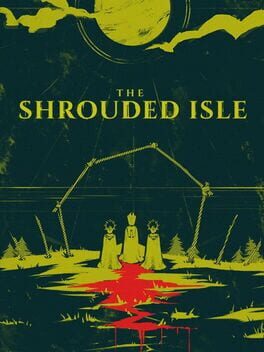I'm deep in the Elden Ring pit along with everyone else, so to buoy me in my most frustrated moments with Miyazaki I'm playing games that are comprised of short, non-twitch reflexive mechanics that try more to inform a thematic gestalt comprised of bursts of rhetorical play and aesthetic cohesion rather than with traditional game worlds and narrative. The Shrouded Isle is that, very specifically indie, ethos to a fault - it takes maybe an hour to explore the ludo-narrative framing, though the game does have mechanical breadth enough to encourage the patented 'gamer get achievement' playthroughs 2-7, even if those runs take place in time well beyond after I-get-it button has been pressed, and the narrative direction is pathed nearly exclusively in the player interaction with the textual states of trans-iteration (meaning that the pathos of any game state is informed by a mechanical interaction/choice made by the player in different kind to the game's prompt). The general aesthetic is cohesively cruel: the eyes in all the NPC's portraiture are obscured, taking away the 'windows to the soul', reinforcing an idea that concrete and severe actions cannot inform a, happily built and maintained, holy intervention in place of democratic connectivity. The muted and washed colour palette paint a stark binary: you have complete black void or a sickly, gory, otherworldly pallour to bloat in. The text is short and opaque enough to make the choices feel tantalizingly uninformed but contain enough purchase to infer things worse than a more descriptive block would allow.
However, the game's best qualities are soon reduced to how they don't really nail their contextualization of the gameplay. Certainly, on the first playthrough, the ball bearings are scraping motion and every death feels either like a gruesome victory or a selfish, political assassination - but, on repeat playthroughs, after you know what vices are inscorned in which lose states, and how they tie in with the petty family squabbles which demand only a puppy dog level of attention to avoid, the literal meters (which, like, c'mon, y'all could've made a less spreadsheet like representation of these values) start to domineer over the flavour, and the pure number values of play overshadow all metaphor about religious superstructures. The incursion of 'illnesses', the promotion of virtues and vices, the staunching of rebellious cohorts; all the possible interpretations of the text become number go up and number go down button pressing even before a victory state is reached, and with so simplistic a play styling, I don't think the roundness of the text and art are able to be as penetrated as the devs would've liked.
However, the game's best qualities are soon reduced to how they don't really nail their contextualization of the gameplay. Certainly, on the first playthrough, the ball bearings are scraping motion and every death feels either like a gruesome victory or a selfish, political assassination - but, on repeat playthroughs, after you know what vices are inscorned in which lose states, and how they tie in with the petty family squabbles which demand only a puppy dog level of attention to avoid, the literal meters (which, like, c'mon, y'all could've made a less spreadsheet like representation of these values) start to domineer over the flavour, and the pure number values of play overshadow all metaphor about religious superstructures. The incursion of 'illnesses', the promotion of virtues and vices, the staunching of rebellious cohorts; all the possible interpretations of the text become number go up and number go down button pressing even before a victory state is reached, and with so simplistic a play styling, I don't think the roundness of the text and art are able to be as penetrated as the devs would've liked.
